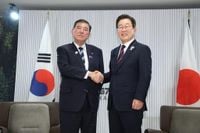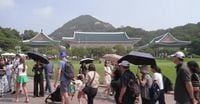In a significant development amid escalating tensions on the Korean Peninsula, South Korea's newly appointed intelligence chief, Lee Jong-seok, has openly stated his belief that the United States would not hesitate to deploy nuclear weapons against North Korea if Pyongyang were to launch a nuclear attack first. This assertion, made on June 19, 2025, reflects the gravity of the security situation in East Asia as North Korea continues to advance its nuclear weapons program.
Lee Jong-seok, who assumed office as the director of South Korea's National Intelligence Service on June 4 under President Lee Jae-myung's administration, expressed this stance during a confirmation hearing. When asked whether he believed Washington would risk American lives by attacking North Korea despite the latter's possession of intercontinental ballistic missiles (ICBMs), Lee responded unequivocally, "Yes, I believe so." He elaborated that any nuclear strike by North Korea on South Korea would directly impact the security alliance between Seoul and Washington, underscoring the intertwined fates of the two nations.
North Korea’s nuclear ambitions have long been a source of regional and global concern. Although Pyongyang is believed to have amassed fissile material capable of producing nuclear warheads, it has yet to test a missile equipped with a confirmed nuclear payload. Nevertheless, the mere presence of such weapons and delivery systems has heightened fears of a potential conflict that could quickly escalate into nuclear warfare.
Amid these rising threats, diplomatic efforts to strengthen regional security cooperation have gained momentum. On June 17, 2025, Japanese Prime Minister Shigeru Ishiba and South Korean President Lee Jae-myung met for the first time face-to-face during the G7 summit in Canada. Their half-hour discussion marked a pivotal moment in bilateral relations, which have historically been fraught due to Japan’s 35-year colonial rule over the Korean Peninsula, including the deeply contentious issue of wartime sexual slavery.
President Lee described the meeting as the beginning of a "more progressive and improved relationship" between the two countries. He emphasized that South Korea and Japan, both advanced democracies and U.S. allies, are "like neighbors sharing a front lawn," bound by inseparable ties especially amid the complex challenges of global trade, environmental issues, and international relations. The two leaders pledged to enhance trilateral cooperation with the United States to address the multifaceted crises posed by North Korea, including its nuclear and missile programs and the longstanding abduction issue.
Prime Minister Ishiba highlighted the significance of 2025 as the 60th anniversary of normalized diplomatic relations between Japan and South Korea, expressing optimism that exchanges among governments, businesses, and citizens would flourish. He noted the increasingly severe security environment in the region and affirmed a commitment to ongoing collaboration in managing North Korea’s provocations.
Both leaders agreed to maintain close communication through reciprocal diplomatic visits, signaling a thaw in relations that could bolster regional stability. This rapprochement comes after a period of strained ties under the previous South Korean administration, which was known for its hardline stance towards Pyongyang and efforts to deepen military cooperation with Tokyo and Washington.
While South Korea and Japan move towards closer cooperation, other geopolitical dynamics are unfolding. Around the same time as the G7 summit, Sergei Shoigu, head of Russia’s Security Council, held his second meeting in less than two weeks with North Korean leader Kim Jong Un. This follows a major military agreement signed last year between Russia and North Korea, including joint defense arrangements.
Shoigu recently announced that North Korea would dispatch two construction battalions, totaling approximately 5,000 troops including 1,000 demining specialists, to Russia’s eastern Kerch region, which has been under Ukrainian attack. This military collaboration highlights the complex web of alliances and rivalries influencing the Korean Peninsula’s security landscape.
The long-standing tensions between Japan and North Korea also remain a critical concern. Issues such as the abduction of Japanese citizens by North Korean agents in the 1970s and 1980s continue to haunt diplomatic relations. Moreover, North Korea’s persistent development of prohibited weapons programs exacerbates fears of instability in the region.
As South Korea’s intelligence chief Lee Jong-seok underscores the possibility of a U.S. nuclear response to any North Korean attack, the renewed commitment between Seoul and Tokyo to cooperate closely reflects the urgency felt by regional leaders to unite against growing threats. Their joint efforts, alongside the United States, aim to deter Pyongyang’s provocations and prevent a catastrophic conflict.
In this precarious geopolitical climate, the alignment of South Korea and Japan, coupled with the strategic partnership with the United States, represents a crucial front in maintaining peace and security in Northeast Asia. Yet, the simultaneous strengthening of military ties between North Korea and Russia adds a layer of complexity that policymakers must navigate carefully.
Ultimately, the developments of June 2025 reveal a region at a crossroads: one where historic grievances are cautiously set aside in pursuit of collective security, even as the shadow of nuclear conflict looms large. The coming months will be critical in determining whether these diplomatic overtures translate into lasting stability or whether tensions will escalate beyond control.


